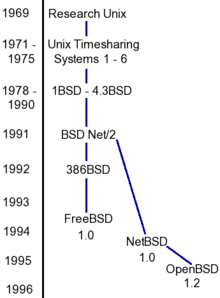Software fork: Difference between revisions
Jump to navigation
Jump to search

imported>Meg Taylor (move links to subgroup) |
mNo edit summary |
||
| Line 8: | Line 8: | ||
* [[Unix]] has been forked literally hundreds, if not thousands of times from the original software developed at Bell Labs | * [[Unix]] has been forked literally hundreds, if not thousands of times from the original software developed at Bell Labs | ||
*"The BSDs" (FreeBSD, NetBSD and OpenBSD) are three popular forks of the original [[Berkeley Software Distribution]], which is itself a descendant of [[Unix]] | *"The BSDs" (FreeBSD, NetBSD and OpenBSD) are three popular forks of the original [[Berkeley Software Distribution]], which is itself a descendant of [[Unix]][[Category:Suggestion Bot Tag]] | ||
Latest revision as of 06:00, 20 October 2024
- This article is about "forking" of a software project into two or more different projects. For the operating system term for starting a new process, see fork (operating system)
A fork of a computer software project is generally a version of the original software that makes use of the same (or a compatible) license, but with a development team that is usually under "new management." Forks usually occur when fundamental design differences can't be agreed upon.
Notable Forks in the History of Software development
- Unix has been forked literally hundreds, if not thousands of times from the original software developed at Bell Labs
- "The BSDs" (FreeBSD, NetBSD and OpenBSD) are three popular forks of the original Berkeley Software Distribution, which is itself a descendant of Unix
